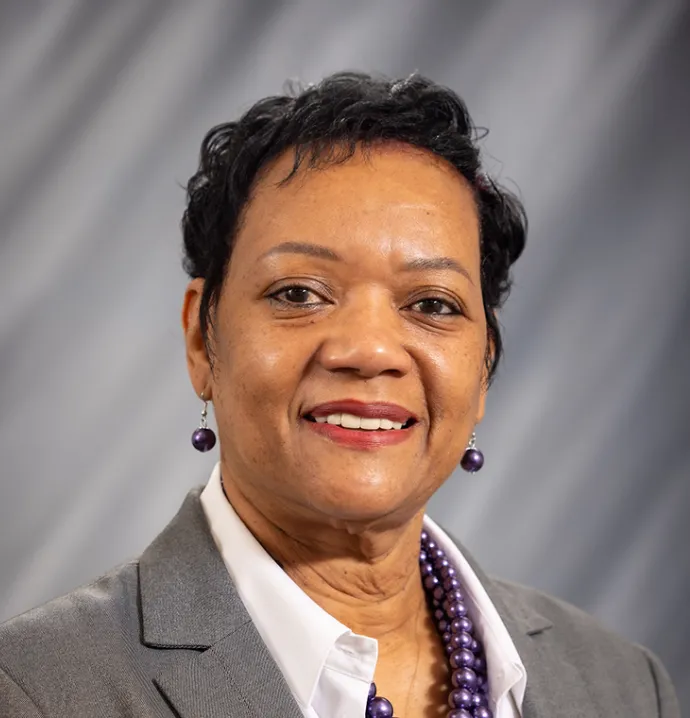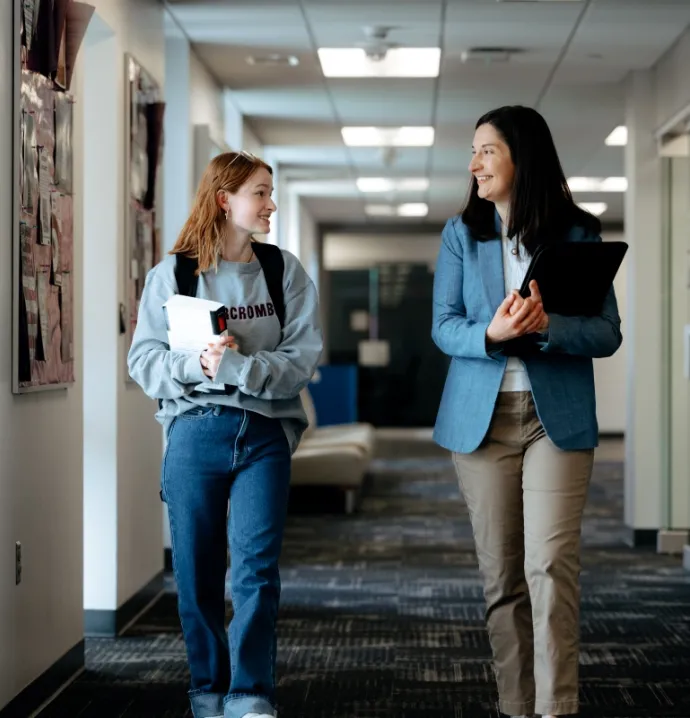Retiring UNI professor leaves legacy of literacy and leadership
Retiring UNI professor leaves legacy of literacy and leadership
Gloria Kirkland-Holmes has spent her life defying expectations — including her own. Growing up in segregated 1960’s Charleston, South Carolina, she saw few opportunities to get the college education she needed to succeed.
“It was very difficult because if you were from a family where you didn’t have money and you were African American, that could cause a problem when looking for colleges and universities to attend,” said Kirkland-Holmes. “But we just learned how to make the best out of what we had.”
She indeed made the best out of her situation, overcoming discrimination and self-doubt to get a doctoral degree in teaching and become a valued member of the UNI community. Set to retire at the end of the spring 2020 semester, she can’t help but reflect on her many accomplishments at UNI. In addition to being a professor in the department of curriculum and instruction, she launched a number of on-campus initiatives to promote diversity.
“With our students, many of them come from rural Iowa and don’t have many racial or ethnic diversity experiences,” she said. “I thought that we needed to provide more experiences for them so that they can understand the culture more. I was able to provide many of those opportunities for them.”
One of those opportunities is the African American Read-In, a day-long event devoted to promoting African American culture and lifting up black authors and illustrators. Students and faculty from across campus come together to read stories by black authors to children from throughout the Cedar Valley community.
Now in its 14th year (this year’s event is February 27), the event is as much about promoting a love of reading and appreciation for diversity in children as it is about helping UNI students and faculty learn more about African American culture. And it’s just one of Kirkland-Holmes’ countless contributions to the UNI community.
“She always sought ways to eliminate barriers so others could have access to opportunities ... to take care of children and to provide them a voice when they were marginalized,” said Dwight Watson, the former dean of UNI’s College of Education. “For her grace, courage, and fortitude, I applaud her.”
Throughout her 41 years at UNI, Kirkland-Holmes created a legacy of leadership that will last long after she retires. It wasn’t an easy road, but Kirkland-Holmes built a career that bested even her own greatest expectations.
A rough start
When Kirkland-Holmes told her high school counselor she wanted to go to Fisk University, a historically black college in Tennessee, she was cautioned that the private institution was too costly to attend. But she wasn’t deterred — she wanted to teach. Thanks to her excellent grades, she secured a scholarship and began her studies there then went on to get her doctorate from Indiana State University. When an opening at UNI’s former Price Lab School emerged , her professors encouraged her to take the job, knowing UNI’s reputation for education.
Coming to Cedar Falls in 1978, Kirkland-Holmes worried about the reception she would receive. Her arrival wasn’t encouraging - a white landlord who had agreed to rent her an apartment changed his mind when they met. But after overcoming so much to get to UNI, Kirkland-Holmes wasn’t about to let one landlord’s seemingly blatant discrimination stand in her way.
“I don’t want to say it was because of race, but when you experience discrimination you begin to accept rejection and lack of opportunities,” she said. “But eventually, you begin to get stronger and struggle on. And then you say, ‘This is my career … it’s not going to help me to just jump up and leave.”
So she stayed — first, that night, staying with friends of College of Education faculty; then for another 25 years, teaching at Price Lab in her dual role as an elementary teacher, as well as a part-time professor in the department of curriculum and instruction. Despite the initial difficulty of getting settled in Cedar Falls, the support she received from senior administration helped immensely — and made her realize she could help make a difference for diversity.
“I appreciate the administration at UNI. The president and the provost, they have been very supportive over the years that I have been here,” she said. “I’m so glad that I chose my career here at the university and I stuck with it. I was able to do some things like publishing books and writing articles and journals and providing teaching ideas to share with people all over the world.”
As a full-time professor, she also taught classes on diversity and inclusion, which were open to majors across campus, in addition to her regular classes for education majors. That’s when she realized just how much of an impact she could have.
A big idea
It started out simple — Kirkland-Holmes wanted to address diversity on campus and in the community by bringing the National African American Read-In, an initiative of the National Black Caucus and the National Council of Teachers of English, to campus. The only requirement is to host a group reading of a book by an African American author. And, at first, that’s as simple as the UNI event was, with Kirkland-Holmes leading a reading to a small group of children.
But interest in UNI’s event was so strong, the event grew exponentially to what it is today — an event featuring guest speakers, arts and crafts, and physical activities, and hundreds of children from throughout the Cedar Valley each year. Attendance grows each year — this year, organizers are expecting 985 children.
After five years of hosting the African American Read-In and overseeing its tremendous growth, Kirkland-Holmes had another big idea — host a conference for the general community to learn about African American culture. She wrote a short proposal for the event and presented it to Watson.
“I went into his office and I had this one page thing typed up. He looked at it and said, ‘I think it’s a great idea. Go for it,’” she said.
Since then, the African American Children and Families Conference has been another successful UNI tradition, growing in attendance and attracting more diverse speakers — like professional football player and politician Corey Holmes, and nationally-renown spoken word artist and activist Jamila Lyiscott — each year. Held annually alongside the African American Read-In, the event is currently in its ninth year.
Making an impact
It seems like Kirkland-Holmes has a way of falling into her leadership roles — one-page proposals and small-scale events become huge productions, and she rises to the occasion every time. That’s what happened with the Shining Stars Girls Project, an off-campus program launched in 2013 by local pastors aimed at empowering African American girls.
“I found that so many of those girls had no one to talk to to help them get on the right path,” she said. “Over the years, I saw the growth in the girls and them trying to do well and do good in the community. Many of them are now adults and are going to college and getting careers, and I feel good that so many of them have done that.”
Of all the programs she’s been involved with throughout her career, the Shining Stars Girls Project is what she’d most like to be remembered for after she retires. But she also wants to see the African American Read-In and African American Children and Families Conference continue to grow.
Kirkland-Holmes plans to stay in the Cedar Valley area when she retires, and hopes to still be involved in the community, though she hopes to see someone else take on planning for her campus events. But until then, she’s happy to lead one last event herself. According to Kirkland-Holmes, that kind of personal commitment is a key part of creating successful events, and making an impact on others — and yourself.
“Things flop, things fail because of people’s attitudes,” she said. “If you have an idea and you want to do something good for the children, for the people, do it anyhow. Keep on struggling. Sometimes you might have to go by yourself, but keep going. My first days here were not easy, but as I get ready to retire, I see my years have taught me how to be strong.”




